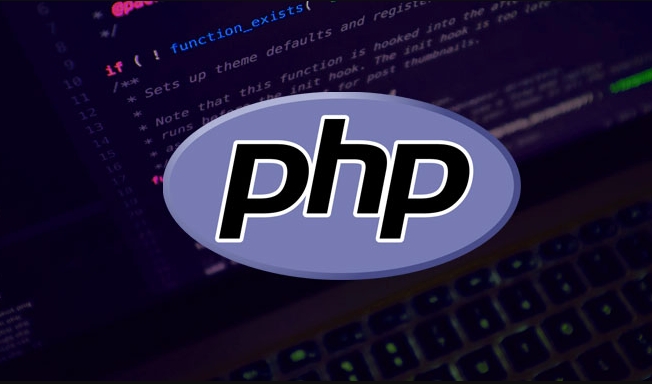 Backend Development
Backend Development
 PHP Tutorial
PHP Tutorial
 How to use intersection types for function parameters in PHP 8.1?
How to use intersection types for function parameters in PHP 8.1?
How to use intersection types for function parameters in PHP 8.1?
Jul 13, 2025 am 01:55 AMPHP 8.1 introduces intersection types, and uses the & operator to specify that values must satisfy multiple type constraints at the same time. 1. When the intersection type is used for function parameters, ensures that the object implements multiple interfaces, such as function example(FooInterface & BarInterface $param). 2. Usage scenarios include designing APIs or libraries that require combination capabilities, and enhancing type safety when combined with mixin and trait. 3. Practical recommendations: Only used for object types and variable naming should clearly express the meaning of the combination type and avoid excessive nesting use. 4. Modern IDEs and static analysis tools such as PHPStan have well supported this feature. 5. Note that the intersection type requires that the object must fully implement all specified interfaces, which are different from the union type and are more stringent.

In PHP 8.1, intersection types allow you to specify that a value must satisfy multiple type constraints at the same time. While union types (using | ) let you accept one of several types, intersection types (using & ) requires a value to be all of the specified types simultaneously.

This can be particularly useful for function parameters when you need an object that implements multiple interfaces or combines traits. Here's how you can use them effectively.

Understanding Intersection Types
Intersection types are written using the & operator. For example:
function example(FooInterface & BarInterface $param): void {
// $param must implement both FooInterface and BarInterface
}Before PHP 8.1, there was no native way to enforce this behavior directly in type declarations — you'd have to check manually inside the function body. Now, it's enforced at the type level.

This is especially helpful when working with complex systems where objects need to conform to multiple contracts.
When to Use Them for Function Parameters
You should consider using intersection types when:
- You want to ensure an object satisfyes multiple interface requirements.
- You're designing APIs or libraries that expect combined capabilities from input objects.
- You're working with mixins or trait-based designs and want stricter typing.
For instance, imagine you have two interfaces: LoggerInterface and SerializableInterface . If a function needs an object that can both log and be serialized, you can now write:
function process(LoggerInterface & SerializableInterface $handler): void {
$handler->log('Started processing');
file_put_contents('data.txt', serialize($handler));
}This makes your expectations clear and avoids runtime surprises.
Practical Tips for Using Intersection Types
Here are some things to keep in mind:
- Interfaces only – Intersection types currently work only with object types (not scalar types like
intorstring). - Order doesn't matter –
A & Bis the same asB & A - Use describe variable names – Since the type already shows what's expected, naming the parameter something like
$loggerAndSerializerhelps readability. - Avoid overuse – Intersection types are powerful but can make code harder to read if overused or nested deeply.
Also, remember that the passed object must actually fulfill all the required interfaces — just implementing one won't be enough.
Compatibility and Tooling Support
As of PHP 8.1 , most modern IDEs (like PhpStorm, VS Code with appropriate extensions) understand interaction types and will provide auto-completion and error checking. Static analysis tools such as PHPStan and Psalm also supports them well.
If you're upgrading older code or working in a team, make sure everyone knows that interference types are stricter than union types and serve a different purpose.
So, when writing functions that expect highly specialized objects, interference types help you express those expectations clearly and safely. It's not complicated, but it does require thinking carefully about your object design.
Basically that's it.
The above is the detailed content of How to use intersection types for function parameters in PHP 8.1?. For more information, please follow other related articles on the PHP Chinese website!

Hot AI Tools

Undress AI Tool
Undress images for free

Undresser.AI Undress
AI-powered app for creating realistic nude photos

AI Clothes Remover
Online AI tool for removing clothes from photos.

Clothoff.io
AI clothes remover

Video Face Swap
Swap faces in any video effortlessly with our completely free AI face swap tool!

Hot Article

Hot Tools

Notepad++7.3.1
Easy-to-use and free code editor

SublimeText3 Chinese version
Chinese version, very easy to use

Zend Studio 13.0.1
Powerful PHP integrated development environment

Dreamweaver CS6
Visual web development tools

SublimeText3 Mac version
God-level code editing software (SublimeText3)

Hot Topics
 How do I implement authentication and authorization in PHP?
Jun 20, 2025 am 01:03 AM
How do I implement authentication and authorization in PHP?
Jun 20, 2025 am 01:03 AM
TosecurelyhandleauthenticationandauthorizationinPHP,followthesesteps:1.Alwayshashpasswordswithpassword_hash()andverifyusingpassword_verify(),usepreparedstatementstopreventSQLinjection,andstoreuserdatain$_SESSIONafterlogin.2.Implementrole-basedaccessc
 How can you handle file uploads securely in PHP?
Jun 19, 2025 am 01:05 AM
How can you handle file uploads securely in PHP?
Jun 19, 2025 am 01:05 AM
To safely handle file uploads in PHP, the core is to verify file types, rename files, and restrict permissions. 1. Use finfo_file() to check the real MIME type, and only specific types such as image/jpeg are allowed; 2. Use uniqid() to generate random file names and store them in non-Web root directory; 3. Limit file size through php.ini and HTML forms, and set directory permissions to 0755; 4. Use ClamAV to scan malware to enhance security. These steps effectively prevent security vulnerabilities and ensure that the file upload process is safe and reliable.
 What are the differences between == (loose comparison) and === (strict comparison) in PHP?
Jun 19, 2025 am 01:07 AM
What are the differences between == (loose comparison) and === (strict comparison) in PHP?
Jun 19, 2025 am 01:07 AM
In PHP, the main difference between == and == is the strictness of type checking. ==Type conversion will be performed before comparison, for example, 5=="5" returns true, and ===Request that the value and type are the same before true will be returned, for example, 5==="5" returns false. In usage scenarios, === is more secure and should be used first, and == is only used when type conversion is required.
 How can you interact with NoSQL databases (e.g., MongoDB, Redis) from PHP?
Jun 19, 2025 am 01:07 AM
How can you interact with NoSQL databases (e.g., MongoDB, Redis) from PHP?
Jun 19, 2025 am 01:07 AM
Yes, PHP can interact with NoSQL databases like MongoDB and Redis through specific extensions or libraries. First, use the MongoDBPHP driver (installed through PECL or Composer) to create client instances and operate databases and collections, supporting insertion, query, aggregation and other operations; second, use the Predis library or phpredis extension to connect to Redis, perform key-value settings and acquisitions, and recommend phpredis for high-performance scenarios, while Predis is convenient for rapid deployment; both are suitable for production environments and are well-documented.
 How do I perform arithmetic operations in PHP ( , -, *, /, %)?
Jun 19, 2025 pm 05:13 PM
How do I perform arithmetic operations in PHP ( , -, *, /, %)?
Jun 19, 2025 pm 05:13 PM
The methods of using basic mathematical operations in PHP are as follows: 1. Addition signs support integers and floating-point numbers, and can also be used for variables. String numbers will be automatically converted but not recommended to dependencies; 2. Subtraction signs use - signs, variables are the same, and type conversion is also applicable; 3. Multiplication signs use * signs, which are suitable for numbers and similar strings; 4. Division uses / signs, which need to avoid dividing by zero, and note that the result may be floating-point numbers; 5. Taking the modulus signs can be used to judge odd and even numbers, and when processing negative numbers, the remainder signs are consistent with the dividend. The key to using these operators correctly is to ensure that the data types are clear and the boundary situation is handled well.
 How do I stay up-to-date with the latest PHP developments and best practices?
Jun 23, 2025 am 12:56 AM
How do I stay up-to-date with the latest PHP developments and best practices?
Jun 23, 2025 am 12:56 AM
TostaycurrentwithPHPdevelopmentsandbestpractices,followkeynewssourceslikePHP.netandPHPWeekly,engagewithcommunitiesonforumsandconferences,keeptoolingupdatedandgraduallyadoptnewfeatures,andreadorcontributetoopensourceprojects.First,followreliablesource
 What is PHP, and why is it used for web development?
Jun 23, 2025 am 12:55 AM
What is PHP, and why is it used for web development?
Jun 23, 2025 am 12:55 AM
PHPbecamepopularforwebdevelopmentduetoitseaseoflearning,seamlessintegrationwithHTML,widespreadhostingsupport,andalargeecosystemincludingframeworkslikeLaravelandCMSplatformslikeWordPress.Itexcelsinhandlingformsubmissions,managingusersessions,interacti
 How to set PHP time zone?
Jun 25, 2025 am 01:00 AM
How to set PHP time zone?
Jun 25, 2025 am 01:00 AM
TosettherighttimezoneinPHP,usedate_default_timezone_set()functionatthestartofyourscriptwithavalididentifiersuchas'America/New_York'.1.Usedate_default_timezone_set()beforeanydate/timefunctions.2.Alternatively,configurethephp.inifilebysettingdate.timez





